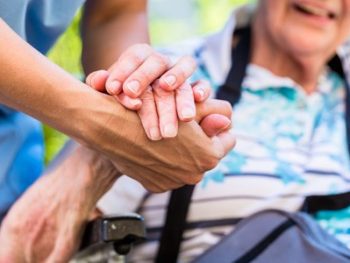When Alison’s Dad fell, she moved in with her parents to help out around the house and make sure they were taking their medications and getting proper meals. With a full time job to manage, what started out as a good deed soon became overwhelming as her parents’ health declined.
The Cost of Compassion
It is our nature to care for loved ones and, for many of us, it brings great satisfaction. Empathy and compassion are desirable character qualities, present in people to varying degrees. These enable us to identify, and in some cases, actually experience the feelings, thoughts, or attitudes of others we care about.
Compassion can come with an emotional cost when caring for someone with a long-term illness. The distress resulting from the constant demands of caring for another, consistently witnessing pain or cognitive decline, can have serious consequences.
In the book, “Overcoming Compassion Fatigue,” author Sharise M. Nance, LCW, CCTP, details how caregiver burnout can manifest itself in exhaustion, depression, apathy, and even physical or emotional disability. “People in ‘helping professions’ are regularly exposed to a range of emotions, from hope to dread, from gratitude to anger, from patience to frustration, and from grief to sorrow.”
One elderly woman had experienced several falls. She lives with her husband who is in advancing stage of dementia. He wakes up several times each night, turns the lights on and gets dressed. Each time, she has to wake up and guide him back to bed often unable to sleep herself. Before getting help, she found herself exhausted, discouraged, and at a greater risk for additional falls.
Some caregivers can internalize the issues of those under their watch, hoping by some herculean effort to fix everything. The sense of responsibility can become disproportionately burdensome and they may lose perspective about what they can and cannot do. This is particularly daunting when a patient has dementia and cannot communicate effectively, or acts out physically.
Making a Plan for Self Care
Prolonged stress is associated with distinct physiological responses that can have long term effects on both physical and emotional health. Often referred to as the fight, flight or freeze response, these chemical reactions are effective in urgent, life-threatening situations, but not sustainable over time.
Ms. Nance noted several emotional states that can accompany caregiver stress:
- Guilt: A sense of being responsible for the illness
- Anger: Frustration with family members or health care workers
- Sadness: Loss of the person as they once were
- Fatigue: Exhaustion from extra work and irregular sleep
- Apathy: Lack of energy to keep up with needed tasks

When these emotions arise, it can be a signal that the caregiver needs to take better care of themselves in order to do what is needed to care for their loved one. If you are in this situation, here are a few suggestions that might help:
- Pace yourself: Take advantage of family or friends who offer to help. Home Care agencies like Pemi-Baker Community Health can provide a volunteer companion or home health aide for a few hours a day to take on the more challenging tasks.
- Set boundaries: Make it clear to the patient and family members what you can and cannot do.
- Seek support: Pemi-Baker Community Health and many churches or senior centers offer support groups for caregivers. While it may not alleviate the challenges you are facing, it can be helpful to know how others are coping.
- Create a self-care plan: As impossible as it might seem, you need a plan for exercise, sleep and proper nutrition. If you are a spiritual person, spending time in prayer or meditation can be helpful.
“Self-care is not a selfish act, but a necessity and priority,” writes Ms. Nance.
Even health care professionals can become overwhelmed at times. Pemi-Baker Community Health employs home health aides and homemaker companions serving clients in 18 central and northern NH towns. “As a licensed home care agency, we are vigilant about providing support to our caregivers,” said Chandra Engelbert, CEO. “We encourage them to practice their own self-care so they can provide the best possible care and attention to our clients.”
Caring for another person can be a gift but also a burden. Anyone in that role has to be mindful of the potential risks, and remember to monitor their own well-being at times, too. All are welcome to our Drop-in Caregiver Support Groups on every 3rd Wednesday of the Month at the Plymouth Regional Senior Center.
~by Anna Swanson



 Chocoroa Masonic Lodge Makes Generous Contribution
Chocoroa Masonic Lodge Makes Generous Contribution
















